Experimental Psychology Graduate Program
Study behavioral neuroscience, cognitive psychology (including cognitive development), and social psychology.
- Home
- Departmental Directory
- Liberal Arts
- Department of Psychology
- Academics
- Experimental Psychology Graduate Program
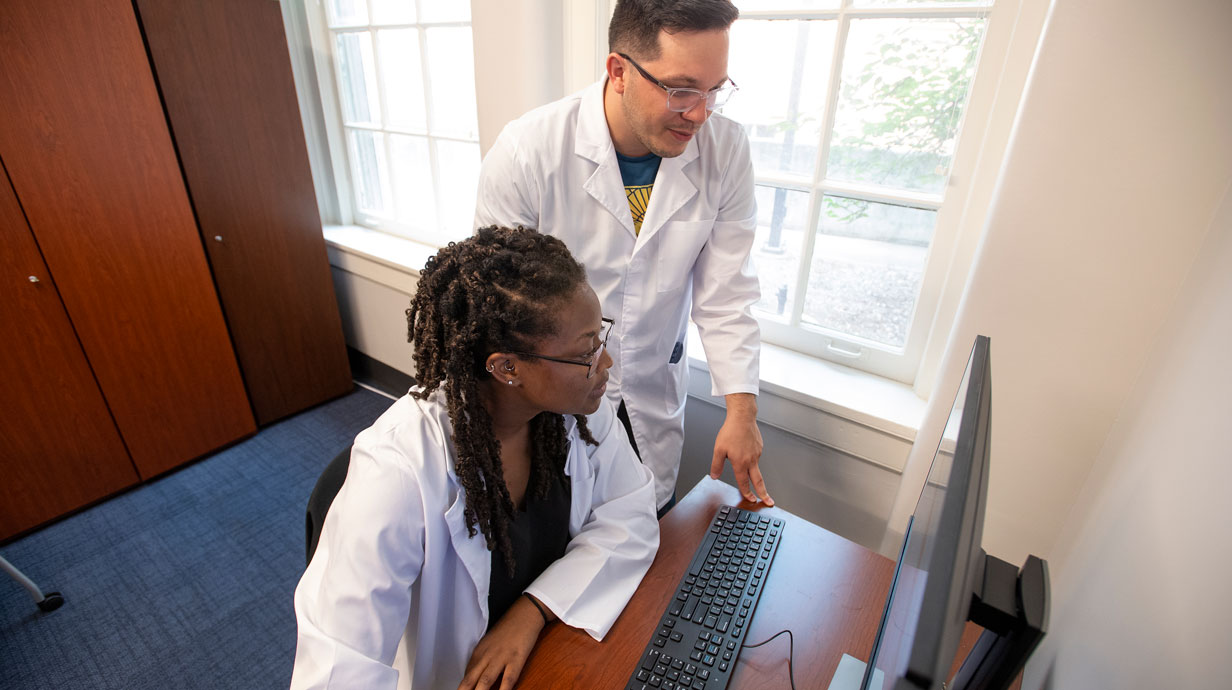
About the Experimental Psychology Program
The University of Mississippi Ph.D. in Psychology with an emphasis in Experimental Psychology provides the rigorous and supportive scientific training that prepares graduates for outstanding careers in a broad spectrum of established and emerging fields.
The program offers
- An individualized, career-oriented course of study with close mentorship and research conference participation;
- Breadth of knowledge and experience, including interdisciplinary opportunities on campus and community engagement
- Research achievement to develop expertise in methods, communications, and with major grants.
- Teaching excellence with pedagogical training.
Admission to the Experimental Psychology Program
APPLICATION DEADLINE: December 1
The GRE (this includes General GRE and Psychology Subject Test) will not be considered for those applying to the Experimental Psychology Ph.D. Please do not submit GRE scores.
Only applicants for full-time enrollment toward the Ph.D. will be considered. We do not accept applications for part-time enrollment or to complete a terminal master's degree.
The Department of Psychology welcomes student applications with the following materials.
- Complete the Graduate School's Online Application.
- Pay the application fee ($60).
- Submit official transcripts.
- International applicants whose first language is not English may be required to submit scores from an acceptable English language proficiency test.
- Upload Supplemental Application materials for the Department of Psychology as one file using the CV link provided in the online application.
- Statement of purpose.
- Resume
- Three letters of recommendation: provide contact information for three recommenders
By Mail:
Official transcripts should be sent to the Graduate School using the following address:
University of MS Graduate School
54 Galtney-Lott Plaza
PO Box 1848
University, MS 38677
By Email:
Official electronic transcripts from domestic (US only) institutions may be sent to gschool@olemiss.edu.
Only transcripts received directly from the college or university will be considered official. Do not send junior/community college transcripts. Transcripts are manually scanned by staff and you should have them sent well in advance of the deadline.
Visit the Graduate School for more information on transcript submission.
Your personal statement should address the following (no more than 2 pages, single spaced):
- Your reason(s) for pursuing a doctoral degree in Experimental Psychology
- A discussion of how your background led to your decision and has prepared you to pursue graduate education in psychology. This may include, but is not limited to:
- Your academic preparation for your proposed field of study
- Your research experiences
- Personal experiences that have uniquely prepared you for graduate school or that sparked your interest in psychology
- Relevant volunteer or paid work experience
- An explanation of why UM is a good fit for your graduate education, addressing:
- Your current research interests
- The name(s) of faculty with whom you would like to work
- The match between your goals and the department's mission.
Admission to the Experimental Psychology program at UM, as at other programs, is extremely competitive. We receive a number of applications each year and, from this group, the experimental faculty invite the top applicants for on-campus interviews. These interviews usually occur in February, and we extend interview invitations weeks in advance.
We consider these on-campus interviews to be an important source of information for applicants in making informed decisions about where and how they will spend the next several years of their lives. While on campus, applicants have the opportunity to observe firsthand what graduate training at UM is really like. Applicants usually interview with experimental faculty members, meet with other graduate students, tour the campus and the psychology department, and attend two informal dinner gatherings.
The Experimental faculty consider all of the information submitted by applicants in making admissions decisions. However, while we do not have absolute cutoffs for grade-point averages, applicants with the highest GPAs tend to be the ones offered admission. We also attend to one's prior experience with research and the rigor of prior coursework.
Because we are a research-oriented program, applications from students who have been involved in empirical research are usually rated higher than those from students with no such involvement. Similarly, we prefer letters of recommendation from academic psychologists who can better assess a student's potential for success in an academic environment. Those applicants with expressed interests in the research areas supported by our faculty are more likely to receive offers of admission.
In general, we encourage applications from students who have an overall undergraduate GPA of 3.0 or higher (on a 4-point scale) and a GPA in psychology of 3.2 or higher. Students with lower scores on these measures who have strong backgrounds in research, particularly those with publications, also receive favorable consideration.
Our faculty and graduate students recognize the value of a diverse student body and a supportive educational environment. Please read more about the Psychology Department's commitment to access and opportunity.
Applicants usually are informed of admission decisions before April 1, and those offered admission are required to notify us of their acceptance of our offers by April 15. We typically admit around 4 – 6 students annually.
Historically we have been able to provide a full tuition scholarship, subsidized health insurance, and monetary stipend each year to every student while enrolled on campus, so long as they are making satisfactory progress and matriculate through the program in a timely manner.
Additional financial support is available through the Graduate School Recruiting Fellowships, and each year we nominate multiple eligible individuals for these awards. The Department also provides funds to help with graduate student travel costs to conferences.
The Graduate School's financial aid webpage lists a variety of funding possibilities.
Academic Information
GRAD
Prepare yourself to become a scientific researcher of human behavior or an evidence-based practitioner.
- Oxford
Director of Experimental Training
Please contact me if you'd like to learn more or have specific questions about the Ph.D in the Experimental Psychology program.
Joseph Wellman
Associate Professor of Psychology and Director of Experimental Training
Experimental Faculty
Jeff Bednark
- Instructional Assistant Professor of Psychology
Anna Kate Edgemon
- Assistant Professor of Psychology
Andrew Hales
- Assistant Professor of Psychology
Robert Hunt Jr
- Adjunct Research Professor
Kate Kellum
- Instructional Professor of Psychology, Director of Undergraduate Studies, Assistant Chair
Mervin Matthew
- Instructional Professor of Psychology
Stephanie Miller
- Professor of Psychology and Provost Faculty Research Scholar for Institutional Transformation
Erica O'Brien
- Assistant Professor of Psychology
Nicolaas Prins
- Associate Professor of Psychology
Matthew Reysen
- Associate Professor of Psychology
Grace Rivera
- Assistant Professor of Psychology
Don Skinner
- Instructional Assistant Professor of Psychology
Carrie Smith
- Associate Professor of Psychology
Rebekah Smith
- Chair and Professor of Psychology
Kenneth Sufka
- Distinguished Professor of Psychology and Pharmacology, Research Professor in the Research Institute of Pharmaceutical Sciences and Director of the Stamps Impact Prize
Kurt Streeter
- Instructional Associate Professor of Cognitive Psychology
Sirui Wan
- Assistant Professor of Psychology
Joseph Wellman
- Associate Professor of Psychology and Director of Experimental Training
Current Experimental Graduate Students
Dr. Edgemon’s Research Group
Dr. Edgemon’s applied research focuses on (a) intervention to improve conditions for justice-involved youth through restorative justice practices and (b) using translational models to understand behavioral demand underlying problematic consumption patterns. Dr. Edgemon also evaluates behavior using translational models, including behavior under control of schedules of covariation.
Current Graduate Student:
- Hailey Stephens
Dr. Hales Research Group: Social Connections and Influence Lab
We research the psychology of social ostracism. Why does it hurt to be left out? Why do people ghost others? How is social exclusion used to influence the attitudes and behavior of other people? We aim to provide replicable answers to these questions, and more, using experimental methods.
Social Connections and Influence Lab website
Current Graduate Students:
- Sarah Mohammadi
- Kayla Pennycuff
- Sydney Wicks
Dr. Miller's Research Group: CUB Lab
We study social and cognitive development across the lifespan, with an emphasis on infancy and early childhood. We are interested in how children come to control their thought and behavior and what supports this development. In addition, we study how this control relates to other social and cognitive processes, like social understanding and memory.
Current Graduate Students:
- Jillian Anderson
- Fatemeh Esfandiari
- Amanda Greene
- Morgan Harris
- Biju Rajbhandari
Dr. Reysen's Research Group
Dr. Reysen's lab specializes in research on human memory, more specifically, social influences on memory performance and eye-witness testimony.
Current Graduate Student:
- Zoe Fischer
Dr. Rivera's Research Group
Dr. Rivera's lab examines Lay Beliefs about the Self, Meritocracy and Heritability.
Current Research Projects
Current Graduate Students:
- Rachael Cavallaro
- Madelyn Church
- Alejandro Garcia
- Mackenzie Jackson
Dr. Carrie Smith’s Research Group
Dr. Smith’s lab focuses on: (a) investigating people’s daily and relational well-being, frequently via Self-Determination Theory, (b) examining the interpersonal aspects of personality and individual differences, including dark personality, attachment, and sociosexuality, and (c) exploring the experiences of and downstream consequences of gender and gender ideology (e.g., sexism, feminism, precarious manhood). Many of her studies utilized intensive longitudinal designs, such as interval-contingent and event-contingent experience sampling.
Current Research Projects
Current Graduate Students:
- Ilayda Akinkoc
- Adam Paul
Dr. Rebekah Smith’s Research Group
Dr. Smith’s research lab focuses on prospective memory (remembering to perform an action in the future) in both young and older adults. Dr. Smith examines false memory (remembering that something happened when it did not) as well as memory correction and improvement. Dr. Smith also studies the effects of distinctive processing on memory.
Current Research Projects
Current Graduate Students:
- Farkhondeh Fakour Manavi
- Gage Regier
Dr. Wellman's Research Group: Shade Lab
The SHADE lab examines antecedents and consequences of prejudice, stigma, and bias. We use perspectives that examine both high and low status group members’ responses to discrimination and how this influences cognition, health, well-being, and intergroup relations. Our lab employs a variety of methodologies including both online and in lab experiments, longitudinal designs, and surveys. Across our research we utilize behavioral, self-report, and physiological reactivity measures to examine the broad consequences of stigma and bias.
Current Graduate Students:
- Hewan Deyass
- Brianna Richmond
- Ana Clara Vieria Zaidan
Student Research
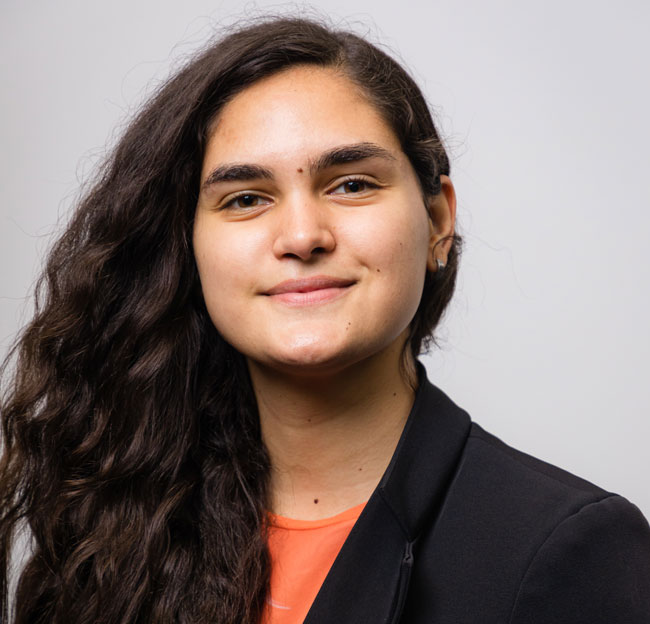
Weight Discrimination Research
"Working on my thesis, I had the opportunity to explore weight discrimination across multiple countries, an opportunity only made possible by internal grant funding. This grant allowed me to access previously unavailable data, enabling a broader examination of how weight stigma operates in different sociocultural contexts. The guidance from my committee and mentor were instrumental in shaping the project. This experience has strengthened my research skills and reinforced mentorship and institutional support in conducting meaningful, cross-national research." —Ana Clara Zaiden
Graduate Student Spotlight
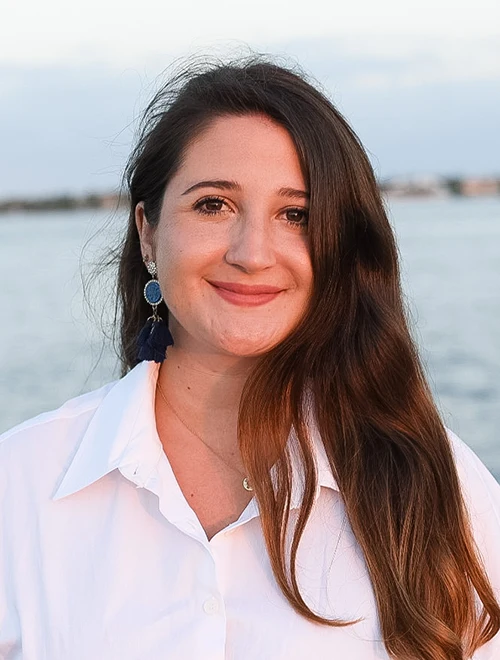
Zoe H. Fischer
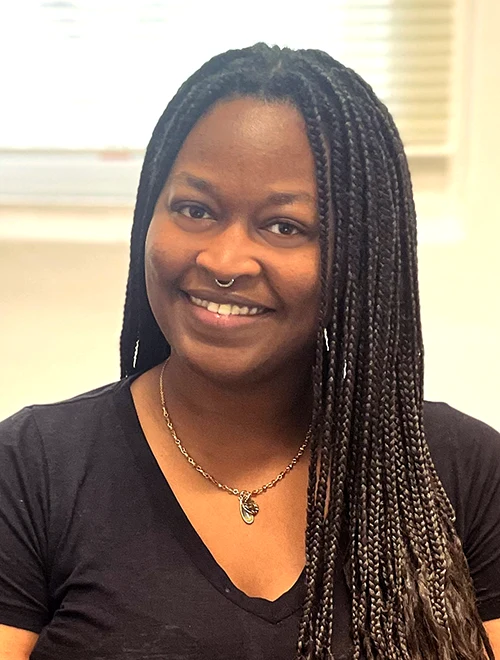
Brianna Richmond
Careers & Alumni
Many of our graduates became post-doctoral fellows as their first professional position. Here are some examples.
- Postdoctoral Fellow Leiden University
- Postdoctoral Fellow Wesleyan University
- Postdoctoral Fellow at the Medical University of South Carolina
- Postdoctoral Fellow at the University of Rochester
- Postdoctoral Fellow at University of Connecticut
- Postdoctoral Fellow at Stanford University
Faculty, Staff, or Administrators at the following Colleges or Universities:
- Arkansas Tech University
- Coastal Carolina University
- Columbia University Irving Medical Center
- East Carolina University
- Eastern Washington University
- Emory University
- Kyoto University
- Louisiana Tech University
- Metropolitan State University of Denver
- Miyazaki International College
- Sam Houston State University
- Shenandoah University
- Southern Utah University
- Troy University
- University of Indianapolis
- University of Louisiana at Monroe
- University of Miami
- University of Mississippi
- University of Nevada
- University of North Carolina at Chapel Hill
- University of Rochester
- University of Southern Mississippi
- University of St. Thomas
- University of Washington Medical School
- William Carey University
- Psychologist, South Texas VA Healthcare Center
- Psychologist, Gundersen Lutheran Medical Center
- Psychologist, Pine Grove Behavioral Health and Addiction Services
- Neuroscientist, General Dynamics Information Technology
- Research Scientist, Lirio Software
- Senior Jury Consultant, Magna Legal Services
- Financial Representative, Lifetime Financial Growth
- Manager, Mahaska Title Johnson Abstract
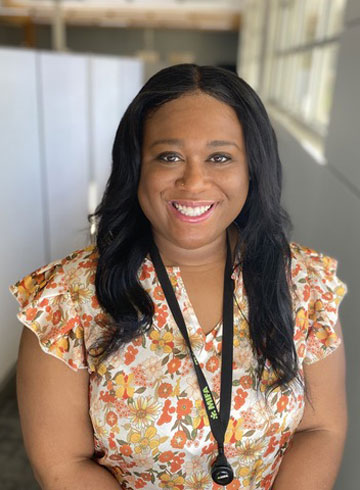
A Lasting Impact
"I have only heartfelt gratitude to for the Department of Psychology. My classes, especially Dr. Carrie Smith's, were a significant reason I stayed motivated and engaged during my time at university. Her passion for teaching and genuine care for her students inspired me to pursue my goals with determination.
It has been seven years since I graduated, and I am currently in grad school pursuing a master's in clinical Mental Health Counseling with a focus on gerontology tackling senior isolation. Early intervention is so important. The lessons I learned in Dr. Smith's classroom have stayed with me and continue to guide my path.
I recently had an article published about my work in our older adult population MIFA's tablets and phone buddies help provide nourishment for seniors hungry for connection (highgroundnews.com), and it made me reflect on the journey that brought me here."
Tyesha Jones
Psychology '17
Alumni Spotlight
Lauren Jordan is an Assistant Professor at Coastal Carolina University
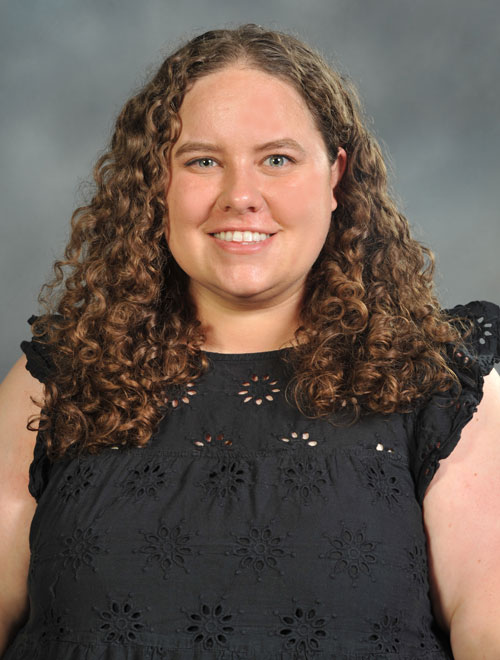
Lauren Jordan
Tell us about your career trajectory since graduation and about your current position.
Meet Lauren